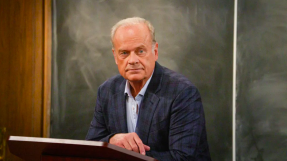Today is #bookloversday, an occasion to celebrate both books and those who love them. Christians of course are fond of books: the Bible contains 66 of them and Christians have been writing prolifically since the Church began.

In an age when refreshing newsfeeds and endless clickbait draws our attention more than a solitary novel, making the time for reading can be tricky, especially for those not naturally book lovers. But book-reading should be something for all to enjoy. The Church too still needs books more than ever, whether it's classics from the past, or new words to address the ever-changing times.
Here's a handpicked selection of books about faith that have moved, challenged or inspired me, each in their own unique way.
1. Gilead – Marilynne Robinson
I don't know of another book like Gilead, a work I was moved to pick up after a myriad recommendations. Marilynne Robinson's American classic takes the form of a memoir by a dying pastor, John Ames, to his son, as he narrates tales from his own life and reflects on the past, present and future of his humble, painful yet rich existence in Gilead, Iowa. It's a tender, theological and profound novel that you simply have to read to understand. This Pulitzer prize-winning work doesn't feel like a 'Christian book', but its reflections are threaded quietly through in a tale that is ultimately about what it means to be human.
2. Reclaiming Hope – Michael Wear
I previously called Michael Wear's Reclaiming Hope the book you need to read in 2017; I stand by the claim. Drawing on his experience of faith and politics in the Obama White House, Wear has produced a part-memoir, part-manifesto that makes the ever-essential case for 'hope' in today's world. Does that word, in an era that grows more cynical by the day – especially about religion and politics – mean anything at all? Wear will show you that it does, providing not just an insightful take on how religion can meaningfully contribute to the here and now, but offering deep and challenging reflections on what truly Christian hope looks like. Whether you love politics or loathe it, this book is for you.
3. Orthodoxy – GK Chesterton
GK Chesterton's Orthodoxy is to my mind the eccentric yet compelling cousin to CS Lewis' Mere Christianity. With characteristic wit and wisdom, the author demonstrates his apologetic, philosophical and imaginative prowess, explaining how he came to believe in the Christian faith and how it illuminates reality. He begins his work: 'I had always felt life first as a story: and if there is a story there is a story-teller.' Here's a book that will stretch, entertain and inspire.
4. Deep Magic, Dragons and Talking Mice: How Reading CS Lewis Can Change Your Life – Alister McGrath
There is no writer more often quoted and more widely beloved in the contemporary Church than CS Lewis. But his library of literature can be daunting – where to start? Lewis biographer Alister McGrath has gifted the world with this book, which imagines conversations with Lewis on a host of different topics, quoting Lewis and explaining his life and ideas in a thoroughly readable way – as though you really were meeting Lewis for tea. For the uninitiated or those who already love Lewis, this book is a gem.

5. The Skeletons in God's Closet – Joshua Ryan Butler
Christian books on apologetics (defending the faith) are easy to find, and can easily bore, but this fresh work stands out from the crowd. Joshua Ryan Butler's The Skeletons in God's Closet boldly takes on some of the most intense objections to (or misunderstandings of) the Christian faith: the cruelty of hell, the struggle with a 'judgmental' God and the horror of Old Testament 'Holy War'. At its heart though, this is not just an intellectual defence of abstract ideas, but a personal, human, and compelling case for the goodness of God. Butler dismantles caricatures, breaks bad paradigms and shows you the big, beautiful picture of Scripture in a way you hadn't seen before, but remains essentially Orthodox. He draws on both scholarly wisdom and personal stories, and doesn't dismiss tough questions with pat answers.
Whether you agree with all the answers he gives, Butler's engaging style, insight and beautiful writing will still make it worth the trip. One brilliant inclusion in the book is one-line 'key idea' summaries at the end of every chapter, reminding you what you've learned. It's a simple addition that really helps readers to stay on track and not get buried in a sea of theological complexity. More books should do it.
6. Being Disciples – Rowan Williams
Sometimes the shortest of books can be the most profound. Sometimes few words shed much light. That's certainly the case for Rowan William's Being Disciples, which, drawing on Scripture, offers a rich six-part reflection on what it means to be a follower of Jesus. The former Archbishop of Canterbury is a towering academic who could easily crush us all with his intellectual heft, but instead offers a humble, graceful and simple devotional on Christian existence before God and the world. There are many excellent introductions to the Christian life, this one is foremost among them.
You can follow @JosephHartropp on Twitter













